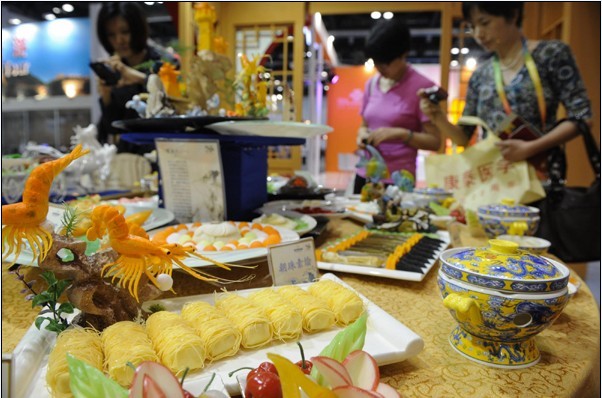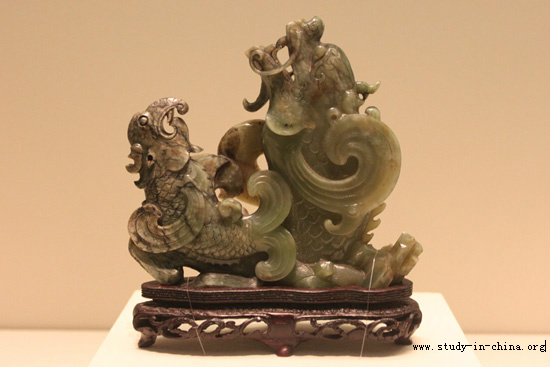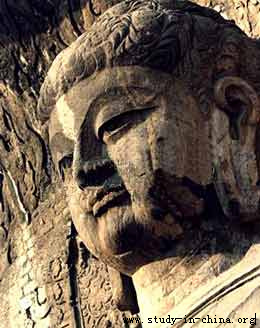| Home > China Feature |
Mei Lanfang——Master of Peking Opera
Mei Lan (22 October 1894 – 8 August 1961), better known by his stage name Mei Lanfang, was one of the most famous Peking operaartists in modern Chinese theater. He was exclusively known for his female lead roles (dan) and particularly his "verdant-robed girls" (qingyi), young or middle-aged women of grace and refinement. He was considered one of the "Four Great Dan", along withShang Xiaoyun, Cheng Yanqiu, and Xun Huisheng.

Mei was born in Beijing in 1894 into a family of Peking opera and Kunqu performers (performers of a traditional Chinese theatre composed of drama, ballet, opera, poetry, and music) of Taizhou, Jiangsu ancestry. He made his stage debut at the Guanghe Theatrein 1905 when he was 11 years old. In his 50-year stage career, he maintained strong continuity while always working on new techniques. His most famous roles were those of female characters; skillful portrayal of women won him international acclaim, and his smooth, perfectly timed, poised style has come to be known in opera circles as the "Mei School." He also played an important part in continuing the performance tradition of Kunqu, noted particularly for his interpretations of Du Liniang (杜丽娘; in The Peony Pavilion) and Bái Sùzhēn (白素贞; inLegend of the White Snake) and Beauty Yu (in Farewell My Concubine). Mei's famous portrayal of Beauty Yu was so historically moving that Wenting Song say he is one of the greatest vocal artists in modern China.
Mei was the first artist to spread Beijing Opera to foreign countries, participating in cultural exchanges with Japan, the United States, and other regions. He toured the world, forming friendships with the western contemporaries of his day, including Charlie Chaplin. In 1930 he toured North America, visiting Hollywood, where he welcomed byDouglas Fairbanks and Mary Pickford.In 1935, Mei toured Europe, playing to appreciative audiences in Berlin and Moscow. Seeing Mei perform especially impressed the German playwright Bertold Brecht and influenced his concept of the alienation effect. He served as one of the mentors and guardians of the actress Li Yuru as she began her career.
In July 1937, the Marco Polo Bridge Incident occurred, and the Imperial Japanese Army soon occupied Beijing. The commander of the Japanese Army ordered Mei to perform for them and appointed Mei to a high rank official position. But Mei refused to sing throughout the duration of the war and endured an impoverished lifestyle until the war ended in 1945.

Sophia
Tel: +86 15857187587;0086-15268518726
Email:study@cuecc.com
Skype: sophia19900813
QQ:2853662502
Wechat:15268518726
Art
 more
moreChina Beijing International Diet ...
Recently, The hit CCTV documentary, A Bite of China, shown at 10:40 ...

Exhibition of Ancient Chinese Jad...
At least 8,000 years ago, Chinese ancestors discovered a beautiful...

Longmen Grottoes
The Longmen Grottoes, located near Luoyang, Henan Province, are a tr...

Custom
 more
moreWeb Dictionary
Martial Arts
Tai Chi Master Class Held in Moscow
MOSCOW, June 15, 2016 (Xinhua) -- Students learn from Shaolin ...
Celebriting 70 years' efforts in restoring Mogao...
Work is being carried out at the restoration site of cave No 98 a...
Hong Kong Children's Symphony performs in Seattle
Under the theme of Tribute to the Golden Age, a concert featuring a ...





 print
print  email
email  Favorite
Favorite  Transtlate
Transtlate 








